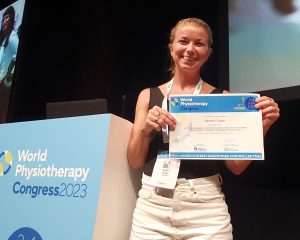
The PEDro prize is awarded to the person who presents the best report of a randomised controlled trial at the World Physiotherapy Congress. The award recognises the achievements of researchers who conduct high quality, clinically important randomised controlled trials. To be eligible, the presentation must have been a primary report for a completed randomised controlled trial that evaluates the effects of a physiotherapy intervention.
Judging was carried out by a panel of international trialists. Scoring was based on quality (risk of bias, size, design and analysis of the trial) as well as significance (importance of the findings for clinical practice).
The winning trial, which scores 8 out of 10 on the PEDro Scale, is Curl-up exercises improve abdominal muscle strength without worsening inter-recti distance in women with diastasis recti abdominis postpartum: a randomised controlled trial. The lead author, Sandra Gluppe from Norway, answers some questions about the trial.
Why have curl-ups often been discouraged for women with diastasis recti abdominis?
I don`t know the exact reason for that, but I think it has to do with fear related to increased intra-abdominal pressure during the exercise or the observed protrusion that can be present in some women during a curl-ups.
What patients did you enroll in your trial?
Primiparous or multiparous women with a diagnosis of diastasis 6 to 12 months postpartum, having a single or multiple pregnancy following any mode of delivery.
What interventions did the trial compare?
An abdominal exercise program lasting for 12 weeks compared to a control group not performing abdominal exercises.
What was the effect of the curl-ups and head lifts on inter-recti distance?
Little to no difference in change on inter-recti distance occurred between the two groups from baseline to week 12.
What was the effect of the curl-ups and head lifts on abdominal thickness and strength?
The exercise group improved the thickness of their rectus abdominis and the maximal isometric strength more than the control group.
What about other outcomes in the study?
At Week 12, participants in both groups were asked to report whether they perceived improvement in their diastasis compared with baseline on a Global Rating of Change scale. At week 12, 20 of 33 participants (61%) in the exercise group and 15 of 35 participants (43%) in the control group reported improvement in diastasis.
Do you think it is important to repeat the study in women with milder diastasis than the threshold that you used to enroll participants in your trial?
No, most of the studies on this field has been conducted on smaller diastasis, but it would be very interesting to investigate women with a severe degree of DRA.
The trial results have just been published. We are looking forward to indexing this article in PEDro.
Gluppe SB, Ellström Engh M, Bø K. Curl-up exercises improve abdominal muscle strength without worsening inter-recti distance in women with diastasis recti abdominis postpartum: a randomised controlled trial. J Physiother. 2023 Jun 5:S1836-9553(23)00052-8. doi: 10.1016/j.jphys.2023.05.017. Epub ahead of print. PMID: 37286390.



